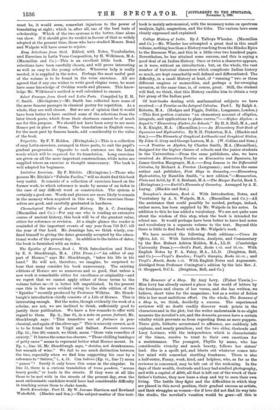The Epistles of Horace, Book i. With Introduction and Notes
by E. S. Shuckburgh, M.A. (Pitt Press.)—"An editor of any part of Horace," says Mr. Shuckburgh, "takes his life in his hand." He will not, therefore, we imagine, be surprised to hear that many consider his book unnecessary. The existing editions of Horace are so numerous and so good, that unless a new work is remarkable either for excellence or originality—and we regret that we cannot apply either of these terms to the volume before us—it is better left unpublished. In the present case this is the more evident owing to the able edition of the "Epistles" recently produced by Professor Wilkins. Mr. Shuck- burgh's introduction chiefly consists of a Life of Horace. This is interesting enough. But the notes, though evidently the work of a scholar, are not we are inclined to think, sufficiently good to justify their publication. We have a few remarks to offer with regard to them. Ep. ii., line 61, in a note on ptenas festinat, Mr. Shuckburgh says: "This transitive use of festinare is prte- classical, and again of the silver age." This is scarcely correct, as it is to be found both in Virgil and Sallust. Fomenta curarum (Ep. iii., line 26) cannot, we think, mean "those vain remedies of anxiety." It leaves the sense too obscure. " Those chilling bandages of petty cares " seems to represent better what Horace meant. In Ep. v., line 16, Mr. Shuckburgh says, " ebrietas, not drunkenness, but warmth of wine." We fail to see much distinction between the two, especially when we find him supporting his case by a reference to " Satires," i., 4, 51. Can ludicra (Ep. vi., line 7) mean " games "? Surely it only bears this sense in the singular. In line 51, there is a curious translation of trans pondera, "across heavy goods," or loads in the streets. If they were at all like those to be met with in the streets of the present day, even the most enthusiastic candidate would have had considerable difficulty in reaching across them to shake hands.


















































 Previous page
Previous page